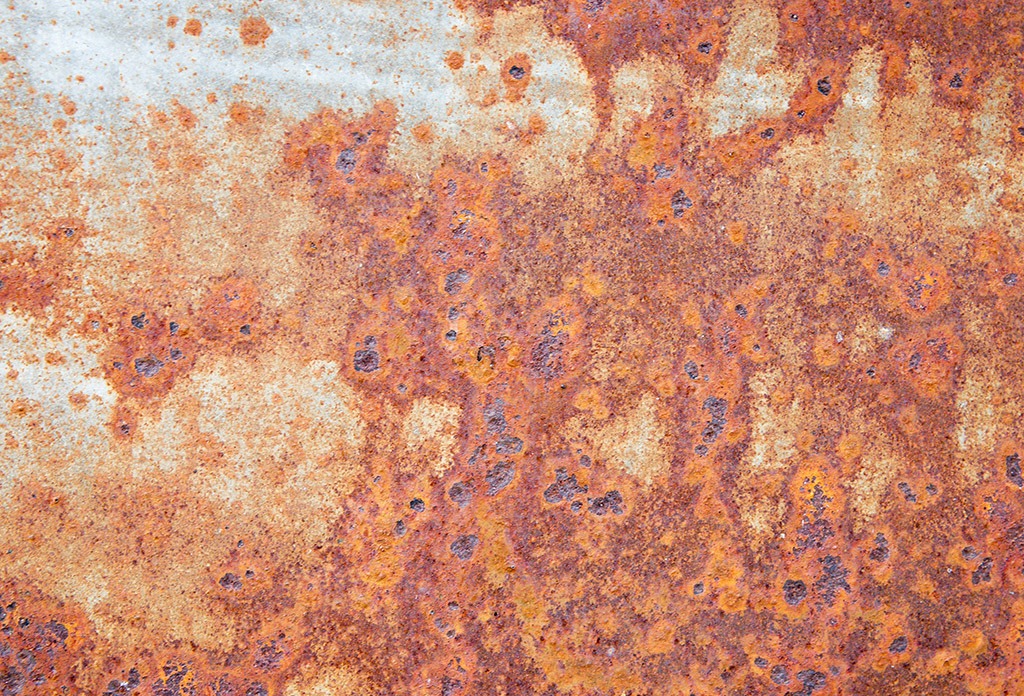For all its strength and versatility, there is still one major weakness that will eventually affect the integrity and aesthetics of steel: rust.
Corrosion can be defined as deterioration due to electrochemical reactions between the metal and its environment. In the case of steel, rusting occurs when the iron in the metal oxidises. What does this look like? Let’s find out.

What does uniform attack corrosion actually look like? Watch this time-lapse video of a piece of steel oxidising to create rust.
Below is a macro time-lapse video of rust forming on mild steel over a period of 2 months. This is a 5mm (0.2 inch) section of the steel, stored indoors at room temperature. Rust begins forming fter just one day, taking over the entire section of steel after two months.
This video is an excellent example of why it is crucial to treat the surface of steel in order to evade this kind of invasion.
Steel Corrosion
So, what is actually happening here? The process of steel corrosion can be broken down into stages:
• Anodic areas on the surface are attacked and ferrous ions go into solution.
• Electrons are then released, they travel through the metallic structure to cathodic sites on the surface. Here they combine with oxygen and water to form hydroxyl ions.
• These react with the ferrous ions from the anode to produce ferrous hydroxide.
• This further oxidises to produce hydrated ferric oxide which is known as ‘red rust’.
This chemical reaction can be summarised like this:
Fe + 3O2 + 2H2O = 2Fe2O3H2O or (Steel) + (Oxygen) + (Water) = Hydrated ferric oxide (Rust)
Uniform Attack Corrosion
The video above is perfect example of what is known as uniform attack corrosion. This is the most common form of corrosion. It is also known as general attack corrosion, and refers to the deterioration of the entire exposed surface of the steel in a manner that is, more or less, uniform (both in speed and surface area).
Differences in between small areas on the steel surface create anodes and cathodes that facilitate the corrosion process.
Steel will corrode uniformly when exposed to open atmospheres, as well as water and soil. In the natural atmosphere, oxygen and moisture in the air will be the main culprit for the corrosion.
How To Avoid Uniform Attack Corrosion
Surface treatment is an extremely effective way to protect against steel corrosion. Here are some of the most common you will see steel fabricators use:
Hot dipping – This galvanisation method can be used on steel of all shapes and sizes and involves immersing the steel in a bath of molten zinc at temperatures up to 450°C. Steel galvanised in this way is highly protected against corrosion as well as extreme weather conditions and this is a particularly popular approach for pipe related applications.
Zinc phosphate priming – Steel surfaces can be painted with specially formulated primers in order to improve corrosion resistance as well as boost their visual appeal, with one of the most popular applications being zinc phosphate priming.
Chemical coating – This brilliant technique uses electrostatic or compressed air to apply a specially formulated powdered material to the steel surface, following which it is melted to form a smooth protective film. Steel treated in this way is not only protected against corrosion and UV damage, it is also highly resistant to peeling, scratching and cracking.
Zinc spray metallising – While it doesn’t provide quite the same protection as hot dip galvanising, this technique is highly effective against corrosion and is popular for its smooth finish. Because this is a ‘cold process’ there is no risk of distorting the metal, making it ideal for use on ornate metal components such as railings and fences.
Need Steel Surface Treatment?
You can read more about steel surface treatment here. Or you can get in touch for a quote or more information.
If you have a project in need of steel, whether it’s supply, fabrication, drafting, or installation, talk to the experts at Steel Fabrication Services. Our dedicated team of professionals will ensure that your project goes according to plan right down to the smallest detail. Give us a call today!
